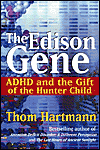
As Thomas Edison once said, "The most certain way to succeed is always to try just one more time." Often Edison kids with ADHD — an umbrella term that includes attention deficit disorder (ADD) — quit trying. Typically, these kids are weary of not fitting in or are furious at feeling forced to do so. Self-protectively, they invent countless ways to avoid, divert, and procrastinate.
I am the author of Dreamers, Discoverers and Dynamos: How to Help the Child Who Is Bright, Bored and Having Problems In School. The original title of my book, when it first appeared in hard cover in 1997, was The Edison Trait: Saving the Spirit of Your Non-conforming Child. People who have the Edison trait are, like Thomas Edison, resourceful, inventive, individualistic, in the minority, and at odds with traditional classroom learning.
The Edison Trait and ADHD: Same or Different?
Is the Edison trait the same as ADHD? I do not equate the two. Like other health care providers, I use the term ADHD technically to describe a specific diagnosis and thereby signal that a problem is serious enough to treat. In this framework, the Edison trait signals a genetic susceptibility to ADHD, but having the Edison trait itself signals not the same as having ADHD.
In my work I've met hundreds of Edison-trait children and adults who also have ADHD. Because their problems with inattention, impulsivity, or hyperactivity are extreme and interfere with their daily lives, they qualify for the technical diagnosis of ADHD. Through the years, I've also have met hundreds of Edison-trait children and adults who don't have ADHD; because their problems with inattention, impulsivity, or hyperactivity do not interfere with their daily lives, they do not qualify for an ADHD diagnosis.
For practical reasons, we need a defining line in order to decide what calls for professional treatment and what does not. Confusion arises because ordinary words can have special, diagnostic meanings in psychology. If you're having a bad-hair day and you say, "I'm so depressed," you're describing a mood, not a diagnosis. If you habitually cry easily at sad moments, you're describing a personality pattern, probably that of a highly sensitive person. However, if you're losing sleep, can't find joy in life, and every day is a bad-hair day, you may qualify for a diagnosis of clinical depression.
Similarly, if you misplace your checkbook and you say, "I'm so attention deficit," you are describing a behavior, not a diagnosis. If you misplace it frequently, you are describing a personality pattern, probably the Edison trait. However, if you're in trouble chronically at work or school due to lateness or unfinished work, you may qualify for a formal diagnosis of ADHD. Your problems cross the line and "interfere with daily living." They lie on the "pathology" side of the line.
Treating ADHD: A Personal Decision
 How do we treat ADHD? Is medication necessary? Every treatment choice demands that we consider its cost-to-benefit ratio. With ADHD, the cost-to-benefit ratio of prescribing medicine is different for each individual. It's even different for the same individual at different times in life.
How do we treat ADHD? Is medication necessary? Every treatment choice demands that we consider its cost-to-benefit ratio. With ADHD, the cost-to-benefit ratio of prescribing medicine is different for each individual. It's even different for the same individual at different times in life.
In Dreamers, Discoverers and Dynamos, I named the chapter on medication "A Personal Decision." This is true for adults, and especially true when deciding for children, who cannot weigh the ratio for themselves. What is right for someone else's child may not be right for yours. And what is right for your child today may not be right for your child tomorrow.
Although we have practical reasons to use terms like pathology and ADHD to communicate diagnoses professionally, we have a responsibility to watch our language in front of our children, who are formative and vulnerable. This is critical because strength-centered approaches motivate, while pathology-centered ones do not. And for children with ADHD, motivation is key.
Growing Out of ADHD
Most of us in the field are intensely interested in why some children with ADHD grow out of it and some don't. (Keep in mind that I am using ADHD as a diagnostic term here, meaning that symptoms interfere with daily living.) The Edison-trait personality endures. Read the biographies of successful artists, athletes, inventors, entrepreneurs, and pilots and you will recognize their lifelong divergent thinking styles. Like Thomas Edison, however, they developed convergent thinking skills too, and learned to keep their balance. Thomas Edison was the most prolific inventor in the history of America. At the same time, he acquired enough bean-counting skill to found and run our largest utility companies, some of which still bear his name today.
Most neuroscientists agree that ADHD symptoms actually indicate problems in the executive functioning of the brain. Executive functions include working memory, foresight, planning, sense of time, and ability to inhibit impulses. These functions are associated with the prefrontal lobes, the last structures to fully develop as the brain matures, and are still being honed in late adolescence and early adulthood. It's not unusual to see an Edison-trait student blossom rapidly in college.
Keeping in mind this fact, as well as an understanding of the normal plasticity of a developing brain (the term used by neuroscientists to describe the fact that the structure of the brain changes and grows, especially in children), it is wrong to assume that a child with ADHD will have ADHD for life. If we do assume this, we risk creating a harmful self-fulfilling prophecy.
Believing in Yourself and in Your Child
It's a well-known fact that stimulation is required for brain growth: A child needs to exercise executive functions in order for these functions to develop. Further, a child's confidence determines how much effort he or she makes: If we believe we can do something, we'll try our best; if we don't believe we can do it, we're less likely to try. For a child, a parent's or teacher's belief can be pivotal.
In one longitudinal study, the only factor that determined whether a child with ADHD became successful as an adult was whether he or she had at least one adult who believed in him or her as a child. As we believe in our children, our children believe in themselves.
Reprinted with permission of the publisher, Park Street Press.
©2003. www.InnerTraditions.com
This article was excerpted with permission from the FOREWORD of the book:
The Edison Gene: ADHD and the Gift of the Hunter Child
by Thom Hartmann.
 Thom Hartmann, citing examples of significant innovators of our modern era, argues that the brains of the children who possess the Edison gene are wired to give them brilliant success as innovators, inventors, explorers, and entrepreneurs, but that those same qualities often cause them problems in the context of our public schools. He offers concrete strategies for helping Edison-gene children to reach their full potential and shows that rather than being “problems,” they are an important and vital gift to our society and world.
Thom Hartmann, citing examples of significant innovators of our modern era, argues that the brains of the children who possess the Edison gene are wired to give them brilliant success as innovators, inventors, explorers, and entrepreneurs, but that those same qualities often cause them problems in the context of our public schools. He offers concrete strategies for helping Edison-gene children to reach their full potential and shows that rather than being “problems,” they are an important and vital gift to our society and world.
Info/Order this book
About the Author of the Foreword
 Lucy Jo Palladino, PhD, is an award-winning psychologist and attention expert with thirty years of professional experience. She has also taken advanced training in sports psychology and served on the clinical faculty of the University of Arizona Medical School. Her research findings have been featured in Family Circle, Men's Health, Los Angeles Times, The Washington Post, The Boston Globe, and Web MD. In recent years, she has appeared as the resident psychologist for the The Morning Show on KFMB-TV, the CBS affiliate in San Diego, California. You can learn more about her work at www.YourFocusZone.com.
Lucy Jo Palladino, PhD, is an award-winning psychologist and attention expert with thirty years of professional experience. She has also taken advanced training in sports psychology and served on the clinical faculty of the University of Arizona Medical School. Her research findings have been featured in Family Circle, Men's Health, Los Angeles Times, The Washington Post, The Boston Globe, and Web MD. In recent years, she has appeared as the resident psychologist for the The Morning Show on KFMB-TV, the CBS affiliate in San Diego, California. You can learn more about her work at www.YourFocusZone.com.
About the Author of the book
Thom Hartmann is the award-winning, best selling author of over a dozen books, including Attention Deficit Disorder: A Different Perception, The Last Hours of Ancient Sunlight,and Unequal Protection. He is a former psychotherapist and one of the founders of The Hunter School, a residential and day school for children with ADHD. Visit his website at: www.thomhartmann.com
























